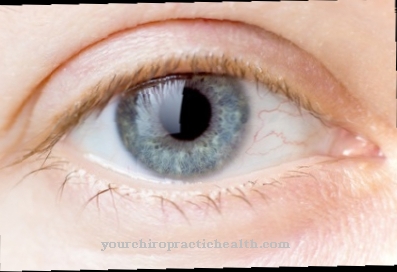As sleep disorders and insomnia These are disorders of the natural need for sleep that occur at regular intervals and not temporarily.
What are sleep disorders?

One only speaks of sleep disorders if the person concerned has little or no normal sleep over a longer period of time. The sleep disorders are then often accompanied by difficulty concentrating, tiredness, decline in performance and general weakness.
Sleep disorders often occur temporarily and are therefore not yet to be regarded as an actual disorder. A distinction is made between different forms of sleep disorders. On the one hand, there are the so-called difficulty falling asleep, which can also occur in the form of difficulty sleeping through the night (insomnia). Here it usually takes more than half an hour for the person affected to fall asleep.
Disturbances of the wake-sleep rhythm (e.g. jet lag or night shifts) and sleep-related disorders (parasomnia) can also occur. The latter also include sleepwalking, grinding teeth or increased nightmares. Usually these forms result in increased daytime sleepiness, which is caused by the insufficient amount of sleep.
causes
The most common causes of sleep disorders are mental and psychosomatic illnesses, disorders or problems (e.g. anxiety disorder). The most common problems with falling asleep mostly result from negative sleep patterns. These can be an unfamiliar environment or intense mental excitement just before bed.
In addition, psychological problems are often responsible for the sleep disorders. Above all, stress, work problems, existential fear and pressure to perform are increasingly causing people to have problems falling asleep.
Sleep disorders can also be caused by illnesses and symptoms of illness. These include, for example, depression and sleep addiction (narcolepsy).
Snoring, drugs, avoidance, coffee and alcohol consumption can also lead to sleep disorders. Ultimately, of course, noise and bright light can also cause sleep problems.
You can find your medication here
➔ Medication for sleep disordersDiseases with this symptom
- high blood pressure
- Overactive thyroid
- Menopause
- Hypersomnia
- Irritable bowel syndrome
- Hypothyroidism
- Burnout syndrome
- Affective disorders
- Anxiety disorder
- hay fever
- Low blood pressure
- Nicotine addiction
Diagnosis & course
Not every wake-up night can be classified as a sleep disorder: The doctor only speaks of chronic insomnia if a patient does not get proper sleep for at least three nights a week for six months or more.
If this is the case, the causes should definitely be clarified medically. To make the diagnosis, the doctor will not only inquire about sleeping habits and current stress factors, but will also perform a physical examination and ask about the consumption of luxury foods.
The expected course depends on the diagnosis. It is clear that sleep disorders only go away on their own in exceptional cases; if left untreated, they usually intensify and solidify over time.
Complications
Sleep disorders can have various complications. Problems with sleeping immediately lead to tiredness during the day, which is often associated with difficulty concentrating and increased irritability. As a result of disturbed sleep at night, performance is often reduced, which increases the risk of work and car accidents.
Sleep disorders that persist over a long period of time can lead to cardiovascular diseases and a weakened immune system. If there is a short-term lack of sleep, the cortisol level also increases and stress reactions occur more frequently. In the long term, sleep disorders lead to premature aging and a reduced life expectancy.
In general, lack of sleep has a negative impact on health and is a risk factor for various serious illnesses. Even after a few nights of disturbed sleep at night, blood pressure rises, accompanied by a variety of complications such as a reduction in well-being, tension and nervousness. It can also lead to stomach problems.
There can also be complications in treating sleep disorders. For example, various sleeping pills put a strain on the internal organs, while personal measures can under certain circumstances increase the sleep disorders. Problems falling asleep or staying asleep as well as other sleep disorders should therefore always be clarified by a doctor.
When should you go to the doctor?
Sleep disorders do not always have to be treated by a doctor. This is especially true if these occur only temporarily and do not burden the person affected permanently.
If the sleep disorders occur after taking alcohol or drugs, these must be discontinued so that the sleep rhythm can normalize. The patient should also avoid coffee and beverages containing caffeine for a few hours before going to bed. However, if the disturbances in falling asleep persist over a longer period of time, a doctor can be consulted. This is especially true if the disorders occur after an unpleasant or traumatic experience. Especially in children, sleep disorders should be examined immediately by a doctor so that there are no further symptoms.
First and foremost, it is advisable to see your family doctor or general practitioner. This can refer the person concerned to the respective specialist. If the patient suffers from a mental illness or depression, a psychologist can be consulted directly. The person concerned should definitely avoid sleeping pills. These promote addictive behavior and can cause damage to the body in the long term.
Doctors & therapists in your area
Treatment & Therapy
A doctor should be consulted in the event of long-term insomnia. The doctor will try to diagnose possible psychological reasons primarily through an intensive discussion. He will also do a physical exam to rule out any illnesses that could be the cause of the sleep disorders.
Usually, an examination is carried out in a so-called sleep laboratory and then evaluated. If it is then found that snoring or sleep apnea are the cause, a sleeping and breathing mask can help.
In the case of stress and psychological problems, a specialist or psychotherapist should be involved in the treatment. He will then try to eliminate possible psychosomatic disorders with the person concerned. At the same time, it is advisable to learn autogenic training and other relaxation techniques.
Furthermore, smoking, alcohol and large meals should be avoided, especially before going to bed. Sport and exercise and lots of fresh air in nature stimulate the metabolism and circulation in a therapeutic way. This has a very calming effect and promotes a quick and deep sleep.
Outlook & forecast
Sleep disorders can usually be treated relatively well, so that the patient can go back to a normal everyday life. Often, sleep disorders are treated with medication and affect the elderly. At this advanced age, sleep disorders are a common condition and do not need to be further examined by a doctor if they are temporary and not too frequent.
If sleep disorders persist, a doctor must be consulted. Often these disorders are triggered by stress or psychological problems. A conversation with a psychologist may also help to identify and combat the cause of the sleep disorders.
If the sleep disorders are not treated properly, it can lead to depression, stress and a general feeling of weakness. This condition can have a negative impact on everyday life and on the patient's quality of life in general. Both everyday life and work are then difficult to master. The permanently bad mood can lead to social problems.
There are no difficulties with the treatment itself; in most cases, treatment of the sleep disorders is successful. However, medication should not be taken over a long period of time, as these can clog the stomach.
You can find your medication here
➔ Medication for sleep disordersprevention
As a rule, you can prevent sleep disorders well. For this it is only necessary, provided there is no disease involved, to exercise a lot in nature and to eat healthy and balanced. However, large portions should be avoided, as well as alcohol and nicotine. Do not drink coffee or black tea and exercise. Learn relaxation techniques like autogenic training. Try to stay away from stress and, if possible, do not postpone problems.
Home remedies & herbs for insomnia & sleep disorders
other home remedies ↵ for sleeping
interference
- Anise helps against flatulence, cough phlegm, asthma and white flow and ensures a good sleep. Put a handful of anise seeds in a bowl of boiling water and inhale the steam.
- Apple tea for insomnia and sleep disorders: peel some apples and let the peel dry. Boil the dried peels in water and sweeten as needed. Drinking two to three cups of tea before bed is a good home remedy for insomnia.
- Valerian is excellent against insomnia and is harmless. Drink a cup of valerian tea every evening before going to bed or take a few drops of valerian on a sugar cube. For the valerian tea, take 3 to 4 grams of valerian per liter of water and let it boil for 5 minutes.
- The active ingredients of valerian soothe and have an antispasmodic effect. A valerian bath helps with difficulties falling asleep, nervousness or stress. Three tablespoons of valerian tincture are added to a full bath or 8 to 12 tablespoons of valerian roots are steeped in 3 liters of boiling water and then added to the bath water. Its nerve-calming effect also makes this bath a help for nervous skin.
- An infusion with dill before going to bed helps with insomnia.
- Hop blossom tea, drunk before bed, is effective against insomnia.
- Briefly boil about 1 to 2 kilos of pine sprouts in 5 liters of water, let them steep, strain and add to the hot bath water. An ideal bath for insomnia, colds and rheumatism. Pine shoots are also popularly called mountain pines.
- In case of insomnia, drink tea prepared as follows: mix valerian roots, lemon balm leaves, peppermint leaves and lavender flowers in equal parts and scald with boiling water. Add two teaspoons of the mixture to a cup and let it steep for about ten minutes. Then drink in sips.
You can do that yourself
In sleep disorders, a distinction is made between falling asleep and staying asleep disorders. Treatment and self-help can vary depending on the cause; the tips often help with both problems. Sleep disorders put those affected into a vicious circle, because the fear of the next sleepless night impairs healthy sleep even more.
Sleep disorder patients have lost the natural way of dealing with sleep. Brooding and resentment at not being able to sleep makes things even worse. The requirement that you absolutely have to sleep, for example because an important conversation is pending, is by no means helpful. Before you go to sleep, imagining pictures of yourself in a safe place can relieve stress.Concentration exercises that keep the breath in focus, visualizations of soothing rippling water or warm sun rays on the skin are very useful. Relaxation exercises also help reduce stress before bed and thus calm the body. It is also helpful to reduce your expectations with regard to sleeping through the night; this can reduce unnecessary stress. Those who accept that they wake up at night ultimately sleep better.
Exercise reduces psychological stress and makes you tired. An endurance run in the early evening can work wonders here. Sex or masturbation will also help you fall asleep. It is advisable to avoid caffeinated drinks in the afternoon as they are stimulating. Sleeping pills should not be taken if possible, the risk of addiction is too great. Psychotherapy can help with serious events that are depressing for a long time.




.jpg)



















.jpg)



